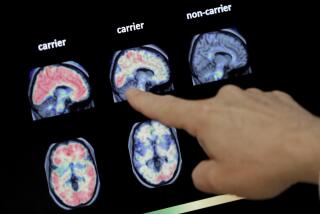Researchers Urge Doctors to Look for Alzheimer’s Earlier
- Share via
Because Alzheimer’s symptoms usually appear several years before the disease is diagnosed, patients often do not get medications that may ease their symptoms and delay admission to nursing homes.
Doctors trying to close that gap are urging families to report warning signs of Alzheimer’s as they push primary-care doctors to screen more regularly for it.
“Primary-care physicians . . . by virtue of their close ongoing contact with patients and families, are ideally placed to diagnose and manage the majority of cases of Alzheimer’s disease,” wrote several Alzheimer’s experts in a paper distributed this past week at the American Academy of Neurology’s annual meeting.
As part of this effort, the academy released guidelines for detecting, diagnosing and managing dementias, the most common of which is Alzheimer’s disease. The revisions, the first from the academy since 1994, take into account developments in therapy and medications.
Alzheimer’s affects 4 million people in the United States and is expected to affect 14 million by 2050. It affects 10% of seniors over age 65 and half of those over age 85, first robbing them of memory and eventually of the ability to move, swallow and breathe.
According to the new guidelines, doctors need to recognize that 6% to 25% of those people with mild cognitive impairment go on to develop Alzheimer’s and other dementias.
Doctors should monitor and regularly evaluate their cognitively impaired patients, as earlier intervention could buy these patients more time with a higher quality of life, according to neurologists.
Diagnostic guidelines call for a doctor to exclude other types of dementia; perform blood tests, depression screening, thyroid testing and liver function tests; and order neuroimaging tests to detect any lesions that could account for symptoms. The neurologists, however, said that at present, there isn’t sufficient evidence to support or refute the use of PET scans, which some researchers have been using to identify changes associated with the disease.
Medications called cholinesterase inhibitors, which include Aricept, Cognex, Exelon and the newly approved Reminyl, can improve memory, thought and reasoning in patients with mild to moderate dementia, the guidelines say. They also can slow progression of the disease.
Other potential therapies include vitamin E, an antioxidant thought to slow progression of the disorder, and the antidepressant selegeline, a monoamine oxidase inhibitor that also acts as an antioxidant. The guidelines encourage doctors to treat agitation, psychosis and depression that may accompany the memory disorder. They encourage caregivers to participate in educational and support programs that can help them keep patients at home longer before turning over to nursing home care.
The authors of the guidelines wrote that future research is needed to establish how normal aging affects cognitive abilities, so that they can distinguish between normal declines and declines associated with dementia.






